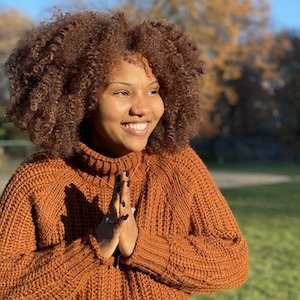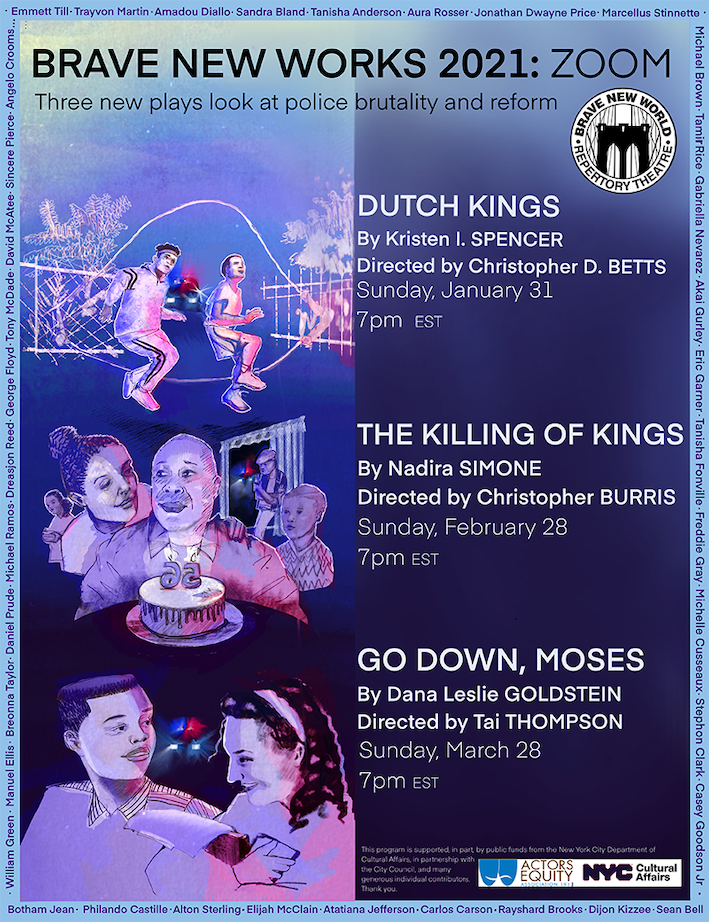Stars Behind the Stars: Kristen I. Spencer
Stars Behind The Stars is a bi-weekly series featuring theatre makers behind the scenes.
This week, we sat down with Playwriting Student Kristen I. Spencer. We discussed her play, Dutch Kings and its upcoming stage reading at Brave New World Repertory Theatre.
Spencer is a Cancer/Leo cusp whose plays include Tuwe Tuwe: Songs Black Girls Sing On Swings When No One Is Watching, River Ain’t Got No Rhyme, and Dutch Kings. Spencer’s work focuses on the examination of Black generational storytelling while using movement, poetry, and dance as a lens. Spencer is the founder and producer of Black & Ivy, a mini series centered around Black student life at predominantly white campuses.
Tell me about your first time in Theatre.
Kristen I. Spencer: I was eight years old and I was at the Greater Allen Cathedral, in Queens, New York. I was nurtured by Georgia Funn, who is now a second mother to me. She taught me that theatre was my second language and my way of communicating with God. We were doring plays that covered heavy topics at a young age and this helped me find my artistic language.
I wrote and directed my first play when I was at church. We were incorporating singing and dance and costumes. For this and many reasons, I find theatre to be a communal experience and a holy experience. At the top of every rehearsal I pray with the group. It’s not to force anyone into Christianity, it’s to establish a holy place to work and a grounding opportunity. All of my plays are rooted in that church experience.
How does being a Cancer appear in your work?
KIS: Well I’m actually a cusp baby. I was born on July 21st which is Cancer and Leo split. I have a scorpio. I see my astrological sign in the rehearsal room and in the process, but not so much in my writing. I’m also a Cancer sun sign, Leo rising, and a Scorpio moon.
What is a choreo-dramatist and what does it mean to you?
KIS: Choreo-play was first coined by Ntozake Shange in For Colored Girls Who Have Considered Suicide / When the Rainbow is Enuf. This play was a triumph for poetry theatre that incorporates music, dance and magic. My work is housed in all of those elements, but maybe not all at the same time. When I say I’m a choreo-dramatist I mean that I’m choreographing the play, but not necessarily the characters’ movement. I’m building the play as if it is a dance. It’s high time to be using the word “choreo” in the title. I differentiate because my definition of choreo-play is rooted in ritual. Ritual is the source of the magic in the piece. Whether it’s a conjuring or a breath exercise, or a hand shake between characters, it is all a ritual.
You and I worked together on the world premiere of Dutch Kings about a year ago. I’d love to hear about how that play started for you.
KIS: It is the hardest play that I have written in my entire life. I have absolutely no business writing this play. I am not a Black man. I grew up in Long Island with two parents. These boys came from mostly single parent households in underprivileged neighborhoods. This play came from an assignment in Lynn Nottage’s class. I had an assignment where characters had to solve a conflict through movement and my characters solved their conflict through Double Dutch.
Another inspiration for Dutch Kings came when I was working on 125th street with the National Black Theatre. I was sitting in a U-Haul in the summer and all of a sudden I heard stamping feet and screaming. There’s this Black boy running down the street for his life. I saw a huge group of kids chasing him, trying to jump him. Some of the older women working with the theatre approached the kids who had eventually caught the boy who was running. This one woman stopped the fight, picked up the boy off the ground and said “I know your mother, I’m taking you home.” They got to him right before he was going to get beat up. I thought about this and what it means to be a Black boy, growing up with that fear. What would that fear make you do? This kid was running for his life, why would a ten year old boy know what that is?
What brought you to turn that story into a play?
KIS: What charged me to write the rest of the play was that I needed to write a play in a time where I wanted to be bold. Columbia has taught me a lot about my emotional limitations. Dutch Kings came at a time where I needed to laugh, to feel bold, and take up space. I felt like I was yelling and nobody was hearing me. This is me hollering about everything that is going on with Black men. Black men are becoming an endangered species by the way of the world. I wanted to encapsulate all of this and still be fun and crazy. I’m writing this for my future son as much as I’m writing this for my father.
What was the process like for developing this show with Brave New World Repertory Theatre.
KIS: The opportunity was sent to me by Lynn and I sent a new draft of Dutch Kings. The application wanted the piece, character descriptions, and my bio. Then there was a semifinal round with ten plays and then there was a final selection. The Artistic Director originally wanted to set up a reading outside of the Festival. Then someone dropped and they moved me into the festival. The theme of the festival is police brutality and because my play doesn’t hit that on the head, it wasn’t originally selected. The Director looked like someone who spoke my artistic language. We did some auditions for Ishmael since he’s the play’s narrator. The play has so much levity with fresh new voices and faces.
This upcoming reading is another stepping stone for another draft. We are much further along, there’s a lot more clarity and the play is much sharper. I’ve loved working with this director. He’s taking the time to mine this play and find the magic on Zoom. We figure it’s necessary to have the stage directions read so that we can have that movement back in the play. We have a bomb sound designer who is making the street noises and sound effects.
Brave New World is adding Dutch Kings to their docket of their summer series. Pandemic pending, we might have an outdoor production of Dutch Kings. I’m pushing for community involvement on this one. If I’m going to have the audacity to bring a bunch of artist hippies to Brooklyn to see this play, the community must be heavily involved. I want this to feel like a Block party. I want Black owned businesses involved in this play and I want their businesses to boom. I relish in the idea of a patron paying for a ticket and a homeless person seeing this play from the side of the street as well. The playing field is going to be leveled.
What else are you working on?
KIS: I am currently writing an animated musical with Khiyon Hursey. We are collaborating with a couple of artists on it. The musical is called Nappy and it’s about Black girls and their hair journey. It’s rooted in gospel and African music.
I am also doing my thesis. I’m working on a new play called Helena. It’s loosely based in Helen of Troy and placing it in a living room play. In Helena it’s the Jones family reunion and the basement keeps flooding. We are talking about Black family units through white women’s discomfort. The play is in the beginning stages.
I’m also dabbling with writing a feature film. The film is aesthetically in the place of Beasts of the Southern Wild. It’s called Infinite. It’s about a Black mother dealing with the death of her famous son who was shot in a drive by. Her son grew up to be a professional and successful rapper. I’m thinking about Biggie’s Mom going through this, although this film isn’t based on that. This film is told in parts and it’s about a mother pouring life into her son, watching him die, and having to pick up the pieces after that.
What’s your favorite play/musical?
KIS: For Colored Girls. I really like Brenden Jacobs Jenkins. I look to him for structure and the rich world of the play that he created. I look to Tarell Alvin McCraney where his stage directions play a role in the story telling. I love when an artist is in line with his brand. I love when I can walk in a room of pages and know that these pages are his. Katori Hall is another one. She makes plays that you can’t argue with. There are no questions to be asked when you read a Katori play. Her plays feel like Thanksgiving, like everyone in the room has a role to play and everyone brings something else to the table. And last, obviously Lynn Nottage. We are very different writers, but her career has taught me so much about how to position myself in the industry and consider if a theatre is going to push me while fitting my aesthetic purposes. It’s nice to have someone like her in my corner, sending me opportunities she knows I want.
Dutch Kings is having the reading on Sunday, January 31, 2021 on Zoom. Tickets are available on Brave New World’s website for a suggested donation..

